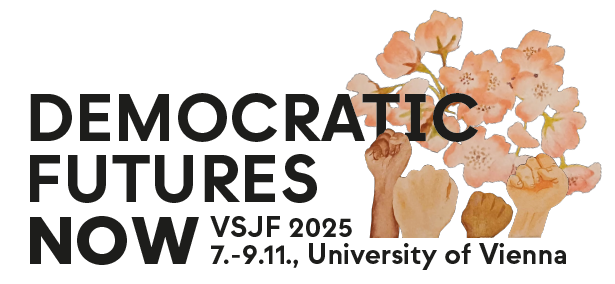(Un)Democratic Pasts: Historical Memory in Hyperpolitical Times in East Asia and Beyond
International Workshop, University of Vienna, June 13, 2025, 3:30 pm. (hybrid)
@ Studierraum, Japanese Studies Department, Spitalgasse 2, 1090 Vienna
Zoom-Link
Please log in here
Topic
Nostalgia for days gone by is widespread in our current political moment. Arguments for a positive trajectory of either democracy or equality feel unfeasible to many. Recent interventions have described a foreclosure of conceiving a democratic future in our society due to a constant focus on the immanent end of democracy by the hands of its foes or a total planetary collapse (White 2024). The concept of “hyperpolitics” (Jäger 2023) aims to grasp the correlating dominant political practices. In hyperpolitical times, everything has turned political, polarized, and deemed highly important in the now. Yet, attention moves quickly from one issue, social media post, or scandal to the next (Jäger 2023). Importantly, this type of politics functions according to the logics of the attention economy, thereby evading institutional work and the building of sustainable change (Cicerchia 2025), leading to a simulative type of democratic politics not rooted in meaningful action (Blühdorn 2013). Debates about “post-truth” echo many of these observations and problems (Newman, Conrad 2024; Galanopoulos, Stavrakakis 2022). Among the seeming helplessness of progressive politics, specters of the past march on. Historically committed atrocities and their underlying beliefs become less stigmatized, radical right-wing politics mainstreamed, and reminders of the past evaporate unfelt. The question emerging out of this description of the present is: What role can historical memory play in hyperpolitical times for progressive imaginaries of the future and successful warnings against repeating the mistakes of the past?
Program
| Name | Affiliation | Title | |
|---|---|---|---|
| 15:30 - 15:40 | Andreas Eder-Ramsauer | University of Vienna | Opening Remarks |
| 15:40 - 17:10 Panel 1 | Prof. Benjamin Nienass | Montclair State University | Memory, Agonism and our 'Moment of Danger' |
| Dr. Anna Wiemann | LMU München | Memory-Work in Post-Disaster Tōhoku: Top-Down vs. Bottom-Up Narratives | |
| Andreas Eder-Ramsauer, MA | University of Vienna | „Left-Wing Reactionism“ or „Progressive Nostalgia“? The Use of the Past in Left-Wing Populism in Japan and its European Influences | |
| Coffee Break | |||
| 17:30 - 19:00 Panel 2 | Prof. Yamaguchi Tomomi | Ritsumeikan University | The Global Politics of Denial: Japan’s Right-Wing Campaigns Against “Comfort Women” Memorialization" |
| Prof. Patrick Vierthaler | Kyoto University | Right-Wing Historical Memory and Mass Media in Post-Authoritarian South Korea: Where did “Rational Conservativism” Fail, and Why? | |
| Dr. Martin Tschiggerl | Austrian Academy of Sciences | Battlefield of Remembrance: The Second World War in digital games | |
| Reception | |||
References
Blühdorn, Ingolfur (2013): Simulative Demokratie. Neue Politik nach der postdemokratischen Wende. Suhrkamp Verlag.
Cicerchia, Lillian (2025): “The futility of hyperpolitics”, Catalyst 8 (4), pp. 128–146.
Galanopoulos, Antonis; Stavrakakis, Yannis (2022): Populism, Anti-populism and Post-truth. In Michael Oswald (Ed.): The Palgrave Handbook of Populism. Cham: Springer International Publishing, pp. 407–420.
Jäger, Anton (2023): Hyperpolitik. Extreme Politisierung ohne politische Folgen. Berlin: Suhrkamp.
Newman, Saul; Conrad, Maximilian (Eds.) (2024): Post-truth populism. A new political paradigm. Cham: Springer Nature Switzerland.
White, Jonathan (2024): In the long run. The future as a political idea. London: Profile Books.







